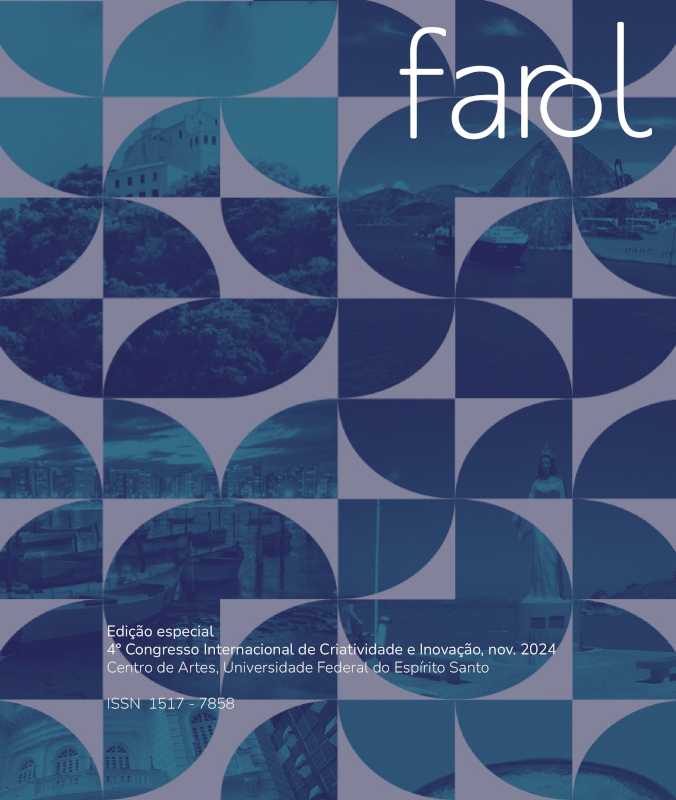Parmi les labyrinthes de l’éthique
la créativité comme catalyseur de la réflexion éthique dans les contextes éducatifs
Mots-clés :
criatividade, ética, educação, desafio, agência pessoal e coletivaRésumé
Dans un monde en évolution, les défis éthiques auxquels la société contemporaine est confrontée sont devenus de plus en plus complexes. Outre les tensions géopolitiques, le changement climatique et les enjeux sociaux soulevés par les migrations, il faut également considérer l’impact de la révolution technologique sur les inégalités sociales. En période d'incertitude, la créativité est fondamentale dans la construction de solutions innovantes et dans l'analyse critique des dilemmes éthiques sous-jacents, en particulier dans des contextes éducatifs où il est urgent de promouvoir l'action personnelle et collective des éducateurs, à travers une réflexion éthique. Cet article réfléchit sur l’importance d’une perspective éthique sur la créativité et discute des stratégies psychologiques et éducatives qui peuvent faciliter son exploration, en vue de construire une société plus juste et équitable.Références
Amabile, T. M. (2018). Creativity and the Labor of Love. In R. J. Sternberg & J. C. Kaufman (Eds.), The Nature of Human Creativity (1st ed., pp. 1–15). Cambridge University Press. https://doi.org/10.1017/9781108185936.003
Bandura, A. (2018). Toward a Psychology of Human Agency: Pathways and Reflections. Perspectives on Psychological Science, 13(2), 130–136. https://doi.org/10.1177/1745691617699280
Batson, C. D. (2016). What’s wrong with morality? A social-psychological perspective. Oxford University Press.
Beghetto, R. A. (2019). Beautiful risks: Having the courage to teach and learn creatively. Rowman & Littlefield.
Beghetto, R. A., & Kaufman, J. C. (2014). Classroom contexts for creativity. High Ability Studies, 25(1), 53–69. https://doi.org/10.1080/13598139.2014.905247
Betts, A., & Collier, P. (2017). Refuge: Rethinking refugee policy in a changing world. Oxford University Press.
Boden, M. (2018). Creativity and biology. In B. N. Gaut (Ed.), Creativity and philosophy (1 [edition]). Routledge.
Brynjolfsson, E., & McAfee, A. (2014). The second machine age: Work, progress, and prosperity in a time of brilliant technologies. W W Norton & Co.
Campos, B. P., & Coimbra, J. L. (1991). Consulta Psicológica e Exploração do Investimento Vocacional. Cadernos de Consulta Psicológica, 7, 11–19.
Ciuriak, D. (2023, July 19). The Digital Revolution Has Transformed Geopolitics. Www.Cigionline.Org. https://www.cigionline.org/articles/the-digital-revolution-has-transformed-geopolitics/
Craft, A. (2002). Creativity and Early Years Education. Continuum.
Craft, A. (2011). Creativity and education futures: Learning in a digital age. Trentham Books.
Eubanks, V. (2019). Automating inequality: How high-tech tools profile, police, and punish the poor (First Picador edition). Picador St. Martin’s Press.
Flood, M., & Phillips, K. D. (2007). CREATIVITY IN OLDER ADULTS: A PLETHORA OF POSSIBILITIES. Issues in Mental Health Nursing, 28(4), 389–411. https://doi.org/10.1080/01612840701252956
Freire, P. (1970). Pedagogia do Oprimido. Paz e Terra.
Glăveanu, V. P. (2017). A Culture‐Inclusive, Socially Engaged Agenda for Creativity Research. The Journal of Creative Behavior, 51(4), 338–340. https://doi.org/10.1002/jocb.198
Glăveanu, V. P. (2020). The Possible: A Theory. Oxford University Press.
Goodman, N. (1978). Ways of worldmaking. Hackett Publishing.
Hennessey, B. A. (2019). Motivation and Creativity. The Cambridge Handbook of Creativity, 374–395. https://doi.org/10.1017/9781316979839.020
Hooks, B. (2019). Erguer a voz: Pensar como feminista, pensar como negra. Editora Elefante.
Kapoor, H., & Kaufman, J. C. (2022). Unbound: The Relationship Among Creativity, Moral Foundations, and Dark Personality. The Journal of Creative Behavior, 56(2), 182–193. https://doi.org/10.1002/jocb.523
Karwowski, M., & Beghetto, R. A. (2019). Creative Behavior as Agentic Action. Psychology of Aesthetics Creativity, and the Arts, 13(4), 402–415. https://doi.org/10.1037/aca0000190
Kumar, S., Verma, A. K., & Mirza, A. (2024). Digital Revolution, Artificial Intelligence, and Ethical Challenges. In S. Kumar, A. K. Verma, & A. Mirza, Digital Transformation, Artificial Intelligence and Society (pp. 161–177). Springer Nature Singapore. https://doi.org/10.1007/978-981-97-5656-8_11
Lythreatis, S., Singh, S. K., & El-Kassar, A.-N. (2022). The digital divide: A review and future research agenda. Technological Forecasting and Social Change, 175, 121359. https://doi.org/10.1016/j.techfore.2021.121359
Marcus, H., Hanna, L., Tait, P., Stone, S., & Wannous, C. (2023). Climate change and the public health imperative for supporting migration as adaptation. Journal of Migration and Health, 7, 100174. https://doi.org/10.1016/j.jmh.2023.100174
Mazdiyasni, O., & AghaKouchak, A. (2020). Natural Disasters Are Prejudiced Against Disadvantaged and Vulnerable Populations: The Lack of Publicly Available Health‐Related Data Hinders Research at the Cusp of the Global Climate Crisis. GeoHealth, 4(1), e2019GH000219. https://doi.org/10.1029/2019GH000219
Sanson, A. V., Van Hoorn, J., & Burke, S. E. L. (2019). Responding to the Impacts of the Climate Crisis on Children and Youth. Child Development Perspectives, 13(4), 201–207. https://doi.org/10.1111/cdep.12342
Selman, R. L. (1975). Level of Social Perspective Taking and the Development of Empathy in Children: Speculations from a Social‐Cognitive Viewpoint. Journal of Moral Education, 5(1), 35–43. https://doi.org/10.1080/0305724750050105
Stromájer, G. P., Csima, M., Iváncsik, R., Varga, B., Takács, K., & Stromájer-Rácz, T. (2023). Stress and Anxiety among High School Adolescents: Correlations between Physiological and Psychological Indicators in a Longitudinal Follow-Up Study. Children, 10(9), 1548. https://doi.org/10.3390/children10091548
Tamannaeifar, M. R., & Motaghedifard, M. (2014). Subjective well-being and its sub-scales among students: The study of role of creativity and self-efficacy. Thinking Skills and Creativity, 12, 37–42. https://doi.org/10.1016/j.tsc.2013.12.003
Tan, C.-Y., Chuah, C.-Q., Lee, S.-T., & Tan, C.-S. (2021). Being Creative Makes You Happier: The Positive Effect of Creativity on Subjective Well-Being. International Journal of Environmental Research and Public Health, 18(14), 7244. https://doi.org/10.3390/ijerph18147244
Valquaresma, A., & Coimbra, J. L. (2021). Creativity, Learning and Technology: Lights and Insights for New Worldmaking Possibilities in Education. Creativity. Theories – Research - Applications, 8(1), 38–51. https://doi.org/doi:10.2478/ctra-2021-0004
Van De Werfhorst, H. G., Kessenich, E., & Geven, S. (2022). The digital divide in online education: Inequality in digital readiness of students and schools. Computers and Education Open, 3, 100100. https://doi.org/10.1016/j.caeo.2022.100100
Van Deursen, A. J., & Van Dijk, J. A. (2019). The first-level digital divide shifts from inequalities in physical access to inequalities in material access. New Media & Society, 21(2), 354–375. https://doi.org/10.1177/1461444818797082
Téléchargements
Publiée
Numéro
Rubrique
Licence
(c) Copyright Andreia Valquaresma 2024

Ce travail est disponible sous licence Creative Commons Attribution - Pas d’Utilisation Commerciale - Partage dans les Mêmes Conditions 4.0 International.
Les auteurs des œuvres soumises à Revista Farol autorisent leur publication sur des supports physiques et électroniques, uniquement à des fins académiques, et peuvent être reproduites à condition de citer la source. Ils attestent de leur originalité, de leur paternité et de leur originalité.





